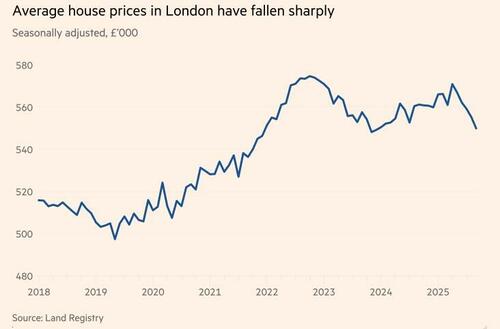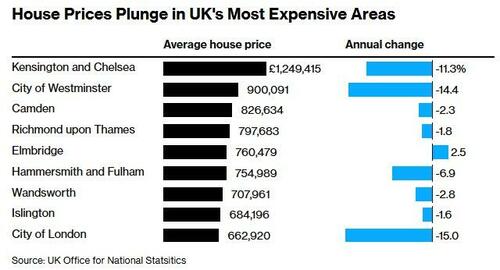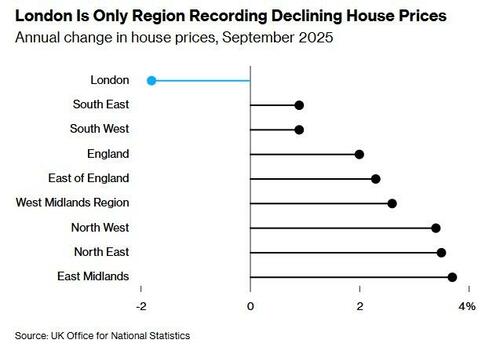Asking prices for UK homes declined more steeply than expected in November, down 1.8% on a monthly basis - the biggest fall in prices for this time of year since 2012.
Interestingly, alongside UK government budget anxiety, Rightmove pointed to "the decade-high number of homes available for sale" and resulting downward price pressure, mostly affecting the higher end of the property ladder.
“Months of pre-Budget speculation has taken its toll on house prices as it has with other parts of the economy,” said Tom Bill, head of UK residential research at Knight Frank.
Colleen Babcock, Rightmove's property expert, commented:
"It appears that the usual lull we'd see around Christmas time has arrived early this year, and sellers who are keen to move are having to work especially hard to entice buyers with competitive pricing...This is a buyers' market."
But the weakness was far from nationwide, with London dominating the drop (especially at the high-end).
Excluding London, all regions in England registered an annual increase in house prices in the year to September. In Scotland they rose by 5.3 per cent, while prices in Wales grew by 2.7 per cent, according to the ONS.
Rumored property tax changes include introducing a new tax on the sale of homes worth more than £500,000, abolishing stamp duty, and introducing a mansion tax on homes valued above £2 million, have dramatically impacted the ultra-high-end luxury home markets with Bloomberg reporting that house prices in the largely-affluent borough of Kensington & Chelsea (K&C) plunging 11.3% YoY, alongside a 14.4% plunge in Westminster.
House prices in the two boroughs combined are above £1 million on average.
Chancellor Reeves is under pressure to fill a whole in the public finances without increasing taxes on what Labour calls “working people.”
A series of policy reversals and rising borrowing costs have already left her billions short of her fiscal targets.
New property taxes would disproportionately affect London properties. A recent report by estate agent Knight Frank found that the capital is home to nearly 60% of all the properties worth more than £2 million.
And forget about any move-up buyers filling that gap...
“In the capital it now takes a couple on an average income around 13 years to save for a deposit, not by accident, but because successive governments have failed to build enough homes,” said Sam Richards, CEO of Britain Remade, a group that campaigns for more development.
The imbalance between supply and demand is giving buyers the twin luxuries of time and choice, and emboldening them to ask for – and get – price reductions.
Simon Gerrard, chair of Martyn Gerrard Estate Agents, blamed the government for the drop in London house prices and warned that a Budget tax on high-value properties would “overwhelmingly hit families” living there.
“It’s nigh on impossible to start a family in the capital and this will ensure that remains the case for many years to come,” he added.
Housing market experts including the TV presenter Kirstie Allsopp saying “people are in a panic” about potential stamp duty changes, and “sitting tight” before the budget.
But, it's hard to argue that these kind of dramatic price declines in the ultra-high-end luxury market are not a very big canary in the coalmine for capital fleeing the repression of the Labour government.
Loading recommendations...


